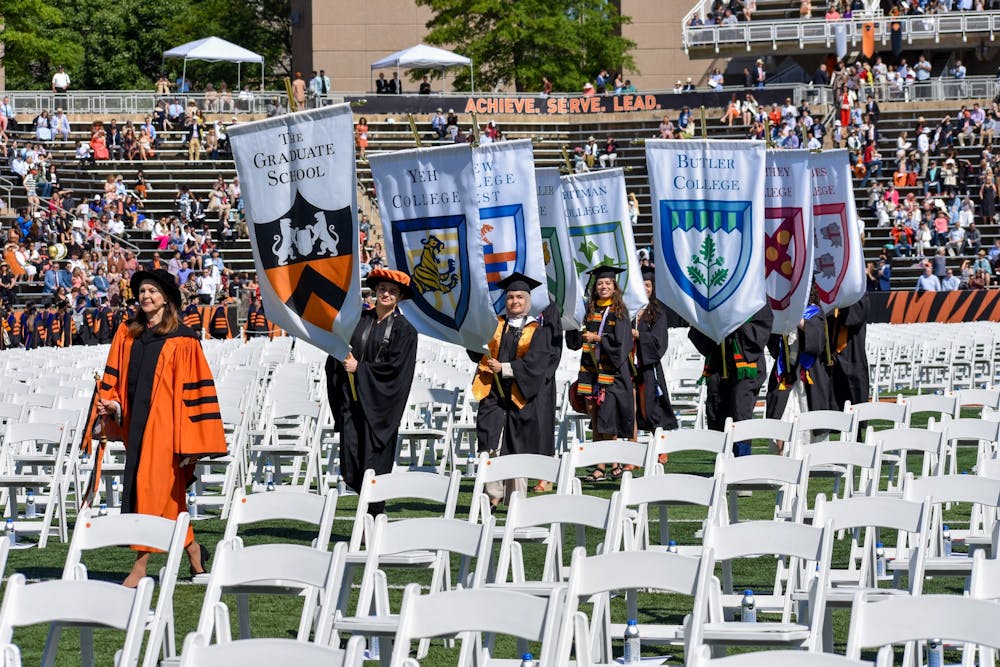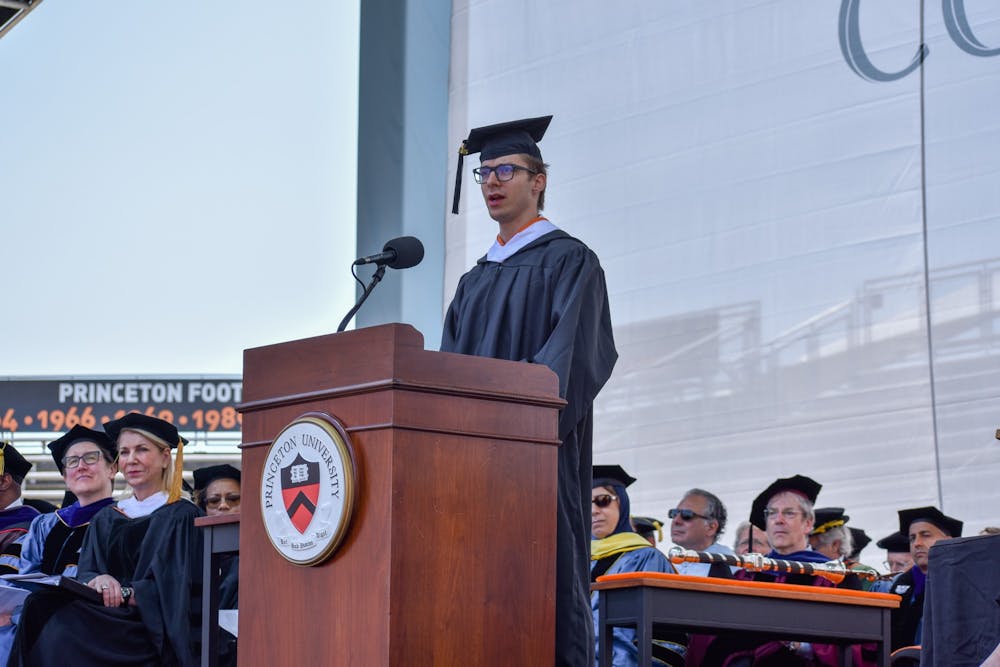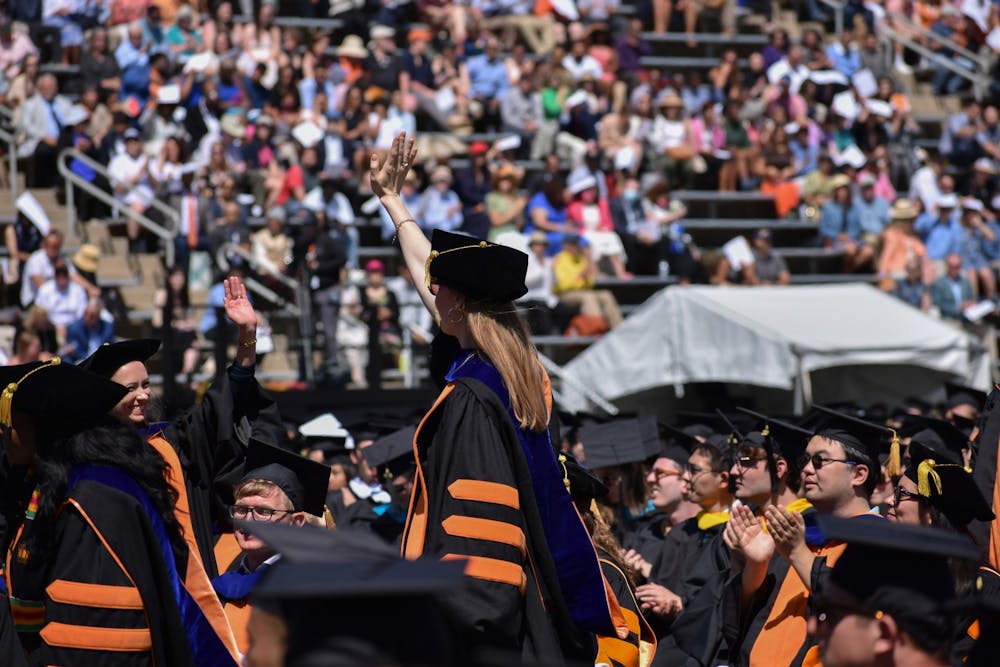Princeton’s 276th commencement ceremony marked the end of three days of graduation festivities, with speakers urging students to go on to lead considerate and conscientious lives.
University President Christopher Eisgruber ’83 delivered an impassioned address to this effect, imploring students to “stand up and speak up together for the values of free expression and full inclusivity for people of all identities.”
His remarks come on the heels of addresses by philosopher Kwame Anthony Appiah, who spoke at the Baccalaureate service, and Congresswoman Terri Sewell ’86, this year’s Class Day speaker, which encouraged students to speak out against injustice by living an ethical life and committing themselves to public service.
Eisgruber shared the story of Harry Belafonte, an American singer and activist who passed away in April and helped lead the Committee to Defend Martin Luther King and the Struggle for Freedom in the South. In March 1960, the committee took out a full-page advertisement in The New York Times, recounting demonstrations by Black civil rights activists and the violence their efforts were met with. The advertisement urged Congress to “heed their rising voices,” referring to the growing number of Black demonstrators in the American South.
The ad led to the 1964 Supreme Court Case New York Times Co. v. Sullivan. The ad erroneously stated that Alabama State College had closed its dining halls to starve protesting students, leading the Times to be sued for libel.
Eisgruber pointed to the 9–0 Supreme Court Decision ruling that the advertisement was permissible. “The expansive, legally enforceable free speech rights that Americans cherish today first emerged in the 1960s during and because of the fight for racial justice in the South, a fight whose leaders included Black student activists,” Eisgruber said.
“I insist on this point today because there is a movement afoot in this country right now to drive a wedge between the constitutional ideals of equality and free speech. There are people who claim, for example, that when colleges and universities endorse the value of diversity and inclusivity or teach about racism and sexism, they are ‘indoctrinating students’ or in some other way endangering free speech,” Eisgruber said.
He pointed to bills passed by state legislatures that would prohibit discussion of sexual orientation or gender identity or limit conversations around race and racism in American schools, telling graduates that “we must stand up and speak up together for the values of free expression and full inclusivity for people of all identities.”

“Your help is urgently needed — now!” he said, mirroring the language used in the “heed their rising voices” advertisement.
“So, as you go forth from this University, let your voices rise,” he added. “Let them rise for equality. Let them rise for the value of diversity. Let them rise for freedom, for justice, and for love among the people of this earth.”
According to the University, 1,265 undergraduate and 679 graduate degrees were awarded at commencement. Other speakers included Dean of the College Jill Dolan, valedictorian Aleksa Milojević ’23 and salutatorian Annabelle Duval ’23.


One student from each residential college were selected to not only represent the college, but be the first to enter the stadium for commencement. The procession was led by Sandra Bermann, chief marshal for University convocations.
Angel Kuo / The Daily Princetonian
Dolan remarked that she was “verklempt” to see the Class of 2023 graduating.
“I have to take a moment here to claim you, as the class Deputy Dean Liz Colagiuri and I admitted during my one year stint as Dean of Admission,” she said.
Dolan recognized the graduates by asking them to stand according to the department they concentrated in.
“Each and every one of you has left your imprint on this University,” she said. “We were honored by your presence, and now we are graced by your legacy.”
In his speech, Milojević reflected on the beauty of Princeton’s various buildings, telling students to “try to remember the joy of seeing them for the first time.”
He also used a quote from “The Brothers Karamazov” to highlight the importance of active love — of “making those around us feel better in small, tangible and practical ways.”
“I understood that Princeton made me feel this love in action long before I read about it. I saw this active love in the encouraging words of dining hall workers who tried tirelessly to learn every student’s name, and I saw it in the efforts of my friends to cheer me up on bad days,” Milojević said.
“As you set off to find new paths around the world, I hope you will keep in your memory the excitement of that cheerful freshman you were four years ago,” he finished. “I hope you will keep the intellectual curiosity that made you take classes outside your major that would not necessarily ‘look good on your CV.’ As you carve your future, I hope you will actively love those around you, as the people on this campus loved us!”

Valedictorian Aleksa Milojević spoke his class about seeking good in both Princeton and as students move forward and seek jobs after graduation.
Angel Kuo / The Daily Princetonian
Duval in her address recounted the challenges wrought by the pandemic.
“Separated from our friends we fled to our childhood bedrooms and in bed wrestled with the Zoom monster,” she said in Latin.
Duval struck a note of levity in her speech, commenting on the men’s basketball team’s NCAA success: “Eager, we watched the athletes of Princeton playing against fierce enemies on the court. We yelled and raised up our hands while celebrating the madness of March.”
Four secondary school teachers were also recognized by University provost Jen Rexford. Wahab Ashraf of Science Park High School, Bob Fenster of Hillsborough High School, Maria Maloupis of Lyndhurst Middle School, and Nancy Picinic Ricca of Pascack High School will each receive $5,000 and $3,000 for their school libraries.
Four Princeton professors also received awards for teaching. Jesse Gomez, assistant neuroscience professor at the Princeton Neuroscience Institute; Rosina Lozano, associate professor of history; associate professor of civil and environmental engineering and the Andlinger Center for Energy and the Environment; and Tamsen Wolff, associate professor of English, will each receive $5,000. Their departments will receive $3,000 for the purchase of books.
Five honorary degrees were also awarded at the ceremony.
A Doctor of Science was awarded to computer science and engineering innovator Lynn Conway, who was fired by IBM in 1968 after disclosing to employers that she was transgender and has notably been an advocate for transgender rights; a Doctor of Human Letter was given to Arcadio Díaz-Quiñones, a leader in Caribbean studies and former leader of Princeton’s Program in Latin American Studies; a Doctor of Music was awarded to Rhiannon Giddens, a two-time Grammy Award winner who has popularized the styles of historically diminished Black musicians; a Doctor of Humane Letters was awarded to Suzan Shown Harjo, a poet and journalist who has long advocated for Native Americans; and a Doctor of Science was given to Katalin Karikó, a pioneer in the understanding and characterization of messenger RNA.
The ceremony ran from 10 a.m. to 11:30 a.m. at Princeton Stadium.
Sandeep Mangat is a head news editor at the ‘Prince.’
Please send corrections to corrections[at]dailyprincetonian.com.








